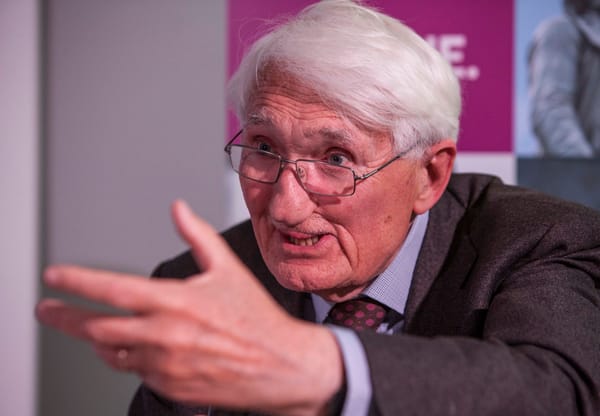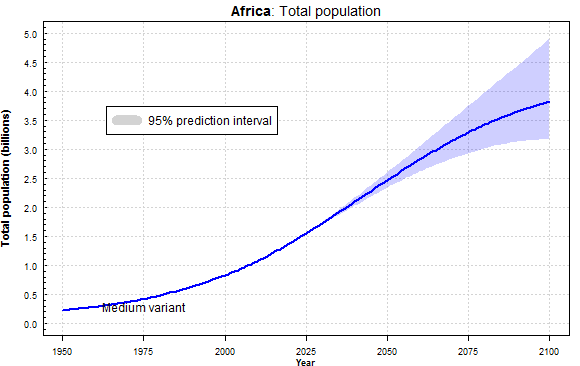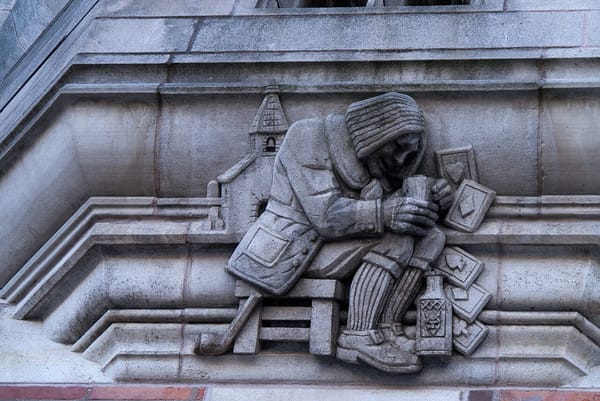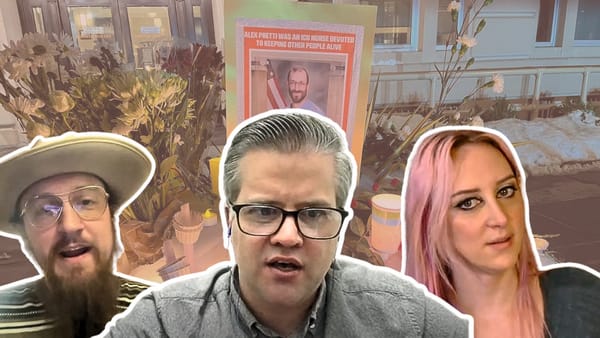Dessalines: A Maligned Hero Gets His Due
Dessalines was a man of action more than ideas, but his actions helped bring revolutionary ideas into existence, along with a wide range of revolutionary thought around the world, inspired by Haiti’s example.
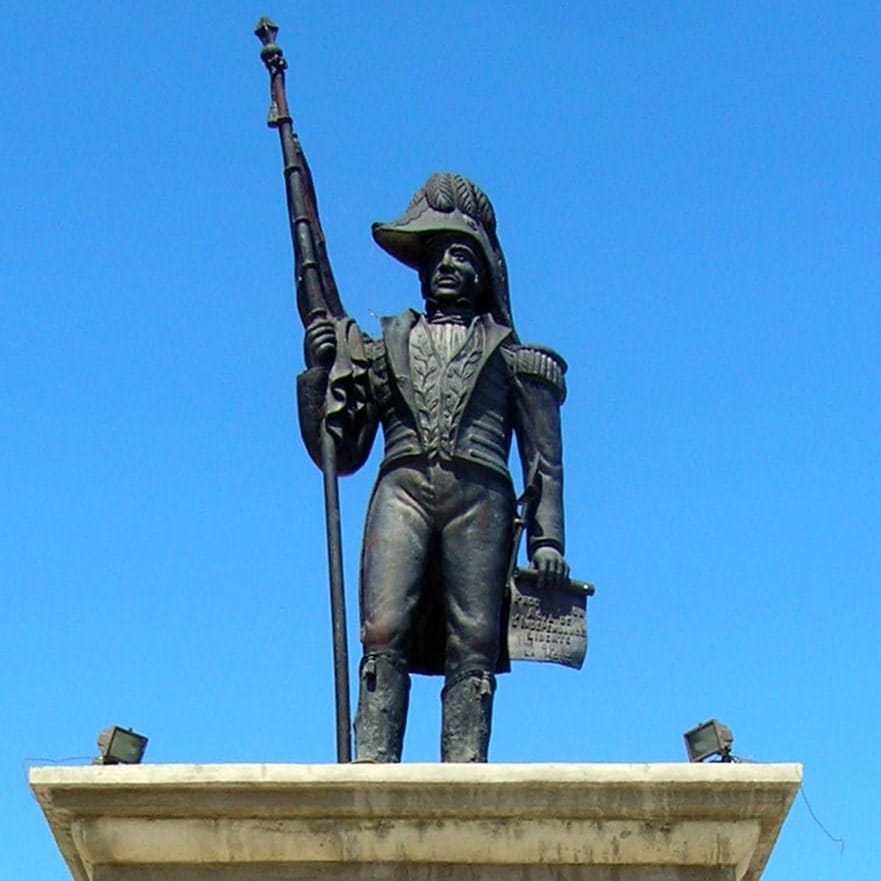
America’s Declaration of Independence begins with a slaveowner’s paradoxical assertion that “all men are created equal,” a paradox we still struggle to resolve. Haiti’s Declaration of Independence, proclaimed a quarter century later, suffers no such embarrassment. Issued by a former slave, it established Haiti as a free country, the first to permanently abolish slavery, three generations before we Americans followed suit.
Yet, Thomas Jefferson—who refused to recognize Haiti’s independence—still holds a place of honor in the liberal political canon, while Jean-Jacques Dessalines, responsible for Haiti’s Declaration, is a virtual non-person—if not a pariah. "His life—and Haiti's very existence—exposed the lie in Enlightenment values that celebrated universal rights while excluding Black people and expanding slavery." So writes Julia Gaffield in her new book, “I Have Avenged America: Jean-Jacques Dessalines and Haiti’s Fight for Freedom.” As she goes on to note, "This standard bearer of the modern ideals of freedom and equality is not only not remembered for his role in the Age of Revolution, in the history of anti-colonialism, and the history of the abolition of slavery, he is maligned."
As Gaffield describes, Dessalines is maligned primarily because of how he was portrayed at the time by his French enemies, as an atavistic African-born mass-murderer, all of which her book refutes. He was Haitian-born, and a celebrated French hero—despite being born a slave—before turning against the country that turned against him. He was not all that different from the more favorably remembered Toussaint Louverture—except that he escaped Louverture’s fate of betrayal and imprisonment, and fought on until Haiti was free—though still not secure from the threat of re-invasion.
While the executions he ordered were widespread, they were not senseless but based on evidence of that threat, and thereafter French residents who pledged loyalty were granted Haitian citizenship. The picture that emerges is of a fierce freedom-fighter, deadly to his enemies, but willing to make peace—though he struggled to find partners in doing so.
Beyond the scope of Gaffield’s book, he inspired others throughout the Americas to revolt as well, along with broader abolitionist movement, which in turn helped produce the distinctive, but neglected legacy of black liberalism described by Keidrick Roy in “American Dark Age: Racial Feudalism and the Rise of Black Liberalism,” and highlighted in Paul Crider’s review. Dessalines was a man of action more than ideas, but his actions helped bring these ideas into existence, along with a wide range of revolutionary thought around the world, inspired by Haiti’s example.
It should be clear that Dessalines was not a liberal in the modern sense, even though his actions in abolishing slavery profoundly helped shape what liberalism has since become. But he crowned himself Emperor of Haiti, mirroring Napoleon as Emperor of France, and his internal opposition was in part centered among those who had had, or aspired to have primitive electoral representation, in line with how European parliamentary practices—carefully curated to maintain white power—spread in the colonial era. Yet, without his determined leadership, slavery very likely would have been reinstated in Haiti, and the world that unfolded as a result would have almost certainly been a profoundly less liberal one.
Gaffield is an historian, not a political theorist, but the history she uncovers contributes to ongoing, more wide-ranging reassessments of political traditions that are intertwined with political and military conflicts across the globe. As the “rules-based” liberal international order that America did so much to put in place now crumbles at that same nation’s hand, liberal democracy is in deep trouble across the globe. In part that’s because the contradictions Haiti’s revolution exposed so long ago have never really been resolved. That’s reason enough to want to set the story straight—or at least significantly less crooked.
I interviewed Gaffield via Zoom. The interview has been edited for clarity and length.
I wanted to begin by asking, "Why this book, why now?" I know it's a very important part of world history that's routinely buried, ignored, or misrepresented. But that’s been true for more than 200 years. So why now?
I’ve thought that Dessalines is an important historical character for decades. But I think that there has been an increased interest in him as a person, particularly in the international community over the last little while. There was a kind of moment a couple years ago when a poster of him appeared in Steve McQueen’s Amazon series and it was kind of unusual, especially in the context of a scene primarily about CLR James, who focused on Toussaint Louverture more. But then he also appeared in a painting in a Beats by Dre commercial a few years ago, so I think he’s getting a little more attention, and some of that has to do with his very radical fight against slavery, colonialism, and racism. I think that that's meaningful for people today, as we are still experiencing the legacy of those things.
You write that he’s not only not remembered for his historic role, “he is maligned,” and I think that puts it mildly. What would you say about why that is?
I think the way he’s talked about now is part of a two centuries-plus long history, in which people during his lifetime criticized him especially as a way to undermine Haiti as a country, and so his identity and Haiti’s independence became intertwined in foreign portrayals of him as a person. In order to try to make sure that Haiti failed as a country, people criticized him as a person. These are descriptions of him as being somebody who is barbaric or savage, and not fit to rule a country.
Those early descriptions have had remarkable staying power and are often cited pretty uncritically—especially given that as historians we know that we need to think about context and the perspectives offered in historical sources. But a lot of those early sources still get used in a way that has been very damaging to his memory and his reputation, particularly abroad.
Part of maligning Dessalines was portraying him as an African-born savage, and you point out that in fact he was born in Haiti, in a complex social setting, with a diverse economy of different crops grown all within the framework of slavery. What was his early experience like?
He was enslaved from the time he was born in the northern region of Saint-Domingue, which at the time was the world's most wealth-producing colony, and it produced wealth based on enslaved labor. The world that he grew up in was shaped in every way by the institution of slavery. Slavery took a lot of different forms in the colony, but it was a society where the economy was shaped by slavery, the social relations were shaped by slavery, and race relations were shaped by slavery. And so it was a world that was very violent and very hostile to the existence and rights of Africans and people of African descent.
He worked on coffee plantations, primarily, but still suffered at the hands of at least one quite cruel enslaver and his whole life experience from the time he was born until he was assassinated was shaped by this fight against slavery and enslavement.
Unlike colonial America—particularly in the South—free blacks and mixed-race people were numerous enough to produce a significantly more complex racial dynamic. What did that look like?
In colonial Saint-Domingue the free population was composed of white colonists, but also free people of color, and the demographics of those two different socio-legal groups was about equal in terms of population. Free people of color could be of mixed-race, but also could be free black men and women. In the slave population, which was much greater, there were internal divisions, social divisions within the population, and particularly divisions between people who were born in the colony, creoles, and people who had been born in Africa, referred to as bossales. And within these different groupings there were hierarchies of stratification and overlap and blurring between these groups. Within the group of free people of color there were plantation owners and enslavers as well.
The French Revolution had a profound impact, but not in a simplistic, straightforward way. How did things unfold?
Free people of color in 1789 started agitating for equal rights as free citizens and I think what is significant about their fight in the first part is that they were advocating for their own personal rights and not for the abolition of slavery. This was a fight among free people. But it's a little more complicated because the memory of their fight ends up being modified and taken up by enslaved people, and subsumed within this broader fight years later.
What is significant is that it showed the population more generally just how difficult the fight for freedom and the fight for equal rights was going to be. Because that fight for equal rights among free citizens was met with very public executions. And yet, months after these executions happened, enslaved people decided that their fight for freedom was worth that risk, even though they knew that it would be met with very severe violence.
That would be when Dessalines first took up arms in the fight?
Yes. I concluded that likely no later than September 1791 Dessalines joined the revolutionary fight for enslaved people for their freedom.
His relationship with Toussaint Louverture is profoundly important. What’s essential to know about it?
Toussaint Louverture is the most well-known figure of the Haitian revolution, particularly in the international community. He and Dessalines had a very long and complicated relationship that began before the revolution. It's unclear exactly when they first met, but for a period of about two and half years Louverture leased the plantation where Dessalines was enslaved. So they met in a situation in which Louverture had control over Dessalines’s labor, it was hierarchical, Louverture was able to give orders and Dessalines was expected to obey them. This was kind of the beginning, but also a consistent feature of their relationship, in which the Louverture is the authority figure and is able to give Dessalines orders.
What is remarkable is that we see this throughout the revolution—that Dessalines is willing to obey those orders, and he illustrated throughout his life that he was very much not willing to obey the orders of people whom he did not respect. The fact that they maintained this hierarchical relationship says something about how they interacted, about the respect Dessalines had for Louverture for most of his life. Their relationship ends very poorly, but I think that’s a moment in which that respect that Dessalines had for Louverture was broken and at that point there’s a change. And I think this is why Dessalines either had a hand in or at least did nothing to stop Louverture’s eventual arrest by the French expeditionary army.
But that only happened later. How were they in the 1790s?
For most of the 1790s Louverture and Dessalines were fighting as officers and generals in the French Republican army. They were very much identifying themselves as French Republicans but then also being rewarded by the French Republican state for their service to the nation. It's kind of an understudy period when Dessalines is being celebrated for his success. He was critical in forcing the British out of their occupation of part of the colony.
So, a turning point came in 1801, over a document seen very differently in Haiti versus France and the rest of the outside world. What happened then, and why?
Louverture’s 1801 Colonial Constitution was not, he forever insisted, a declaration of independence from France. It was simply a way to ensure the abolition of slavery in the colony, which was in jeopardy of being undone. Proslavery forces had taken control of the French government and so he issued a constitution, because the French Constitution had allowed for special laws for the colony, which could be used to re-legalize slavery in the colonies. He issued this Constitution as a way to ensure the permanent abolition of slavery in the colony. But the Constitution gets interpreted by people in France, but also people in the British Empire and the United States as a Declaration of Independence from France and it inspires a re-invasion of the colony, directed by Napoleon Bonaparte.
So what happens with that rather violent invasion?
This expedition is called the Leclerc expedition. It’s led by General Charles Leclerc, brother-in-law to Napoleon. They arrived in the colony with instructions to take away power from the colonial generals, including Louverture and Dessalines, and then to regain control over the colony and reestablish order. In all of the official instructions, there's no mention of slavery. But the real impetus for this re-invasion is the reestablishment of slavery and the attempt to revive the colony as a plantation colony.
It's a really complicated expedition and there’s a period of time in which Dessalines allies—at least on paper—with this expedition, after several top generals had conceded and submitted to the expedition. That’s the moment I referred to earlier, in which Louverture loses Dessalines’s respect in his concession to the Leclerc expedition. So there are about four months when Dessalines is allied with the Leclerc expedition, or at least pretends to be allied with it.
But that was only after Dessalines had objected strongly to Louverture’s surrender, correct?
He did. Louverture in his memoir describes this scene, in which Dessalines and another general, Charles Bélair, are crying and pleading with him not to surrender to the Leclerc expedition. I think it's a dramatic moment in their very long relationship and friendship. But then, the genuineness of the following alliance is always up for debate. I concluded that his alliance with the Leclerc expedition is very strategic. It's based on self-preservation and the recognition that he did not have the power, that it wasn't the right moment to fight against France, and that he had to wait for a better moment to turn.
That's in the summer and into the fall of 1802. When news arrives in the colony that France has re-legalized slavery in certain parts of the French empire, that's the moment when Dessalines and other generals decide that now is the time to make a move for independence.
That final period of struggle was relatively brief, coming after more than a decade of struggle. What happened then?
In terms of the broader trajectory of the Haitian revolution, the war for independence is the last year or so of the revolution and it's a period characterized by extreme violence. The Leclerc expedition is now led by another man, Donatien Rochambeau. The plan for the expedition was basically to execute most of the generals, all of the officers, and anybody wearing an epaulette—like all of the revolutionary forces—and then repopulate the island through the transatlantic slave trade, and try to start over.
So they’re targeting people for mass killing during this time period. This is a fight for independence and a fight for freedom, but it's very much a fight for their lives, because the result would be that they would be killed.
It’s also where we really start to see Dessalines’ diplomacy in the historical record, when he's planning for independence and he writes to Thomas Jefferson, he writes to the governor of Jamaica to try to establish primarily trade relationships, but also a diplomatic relationship and in support of Haitian independence. So he’s setting the stage for the country that has yet to be declared; he is moving in that direction and setting the stage. It's a really critical moment in terms of his military leadership, but then transitioning into a head of state.
They finally do win and declare independence on January 1, 1804, but it’s not a well-known document, certainly compared to the American one. What should people know about it?
What I think is actually significant about that moment is that they won on the battlefield, but very few people recognized that victory. So the Haitian Declaration of Independence is very much a call to arms, because they knew that their fight was going to continue. So January 1, 1804 is often framed as the end of the Haitian revolution, but at the time it was very much an ongoing fight. It’s the second successful declaration of independence to establish a lasting nation-state, the second in the Americas.
But it’s a dramatically different document from the US declaration. There are similarities, such as grievances against the mother country, but there's an emphasis on universal freedom in a very different way. The fight against slavery that was rhetorical or metaphorical in the US declaration is a literal fight against the institution of slavery. And so the document establishes Haiti as an independent country, but very specifically Haiti is a free country. It establishes the first country that permanently abolishes slavery.
The aftermath of issuing the declaration is the period in which Dessalines’s historical image in the outside world gets fixed. What happened then?
The first four months of 1804 are the most controversial months of Dessalines’s leadership, because it had become clear to him and the government that France intended to continue waging war against the new country, and Dessalines ordered the execution of many white French people who remained in the colonies. They were colonists, but they were also people who had participated or supported the recent Leclerc expedition. These were people he viewed as a threat to the existence of Haiti as a country, possible supporters for another French invasion, but also people who were basically guilty of the crimes committed by the Leclerc expedition and guilty of the crime of slavery.
These executions—many people still today but also at the time used the term ‘massacre’—became attached to Dessalines’s public image. This is tied up in the effort to undermine Haiti as a country, and to frame Dessalines as barbaric, somebody who is very violently killing people for no reason. This is often what gets repeated, that these people were innocent, and therefore did not deserve to be killed.
There’s this narrative that they were just helpless bystanders in this fight, when Dessalines and the Haitian government clearly articulated that that was not the case. These are people who had participated in the Leclerc expedition, and who were dangerous to the new nation, which was still very much under threat by the French government.
This wasn’t just a conspiracy theory, they had compelling evidence, right?
The French were publicly proclaiming that they intended to re-invade the island. They had a general, Ferrand, stationed in the city of Santo Domingo on the eastern side of the island who was waging war by attacking Haitian and foreign ships, publishing proclamations. There's other evidence that the Haitian government uncovered, correspondence among the colonists who remained speaking against the Haitian government and therefore might have been collaborators of the French re-invasion.
I think what’s important to keep in mind about these events is that at the time they got framed as—the term that gets used is a “general massacre.” The suggestion is that every single white person in the colony was killed, which is just not true. There were plenty of white people who remained, some of whom would have been identified as being French and many of those people were given Haitian citizenship, and became Haitian. And other foreign white people, British people, Americans who were in the country, were also safe. There's plenty of evidence that hundreds of white people remained in the country after these alleged massacres.
The impression I came away with from your book was that the Haitian Revolution was a fight to actually end slavery, whereas in America, as you say, it’s metaphoric. Slavery wasn’t ended in America for another three generations, and it took an incredibly bloody civil war. So liberalism as it actually existed in the world was not synonymous with ending slavery. That was Haiti’s contribution, it was independent of our American narrative and came from the slaves themselves. Is that a fair reading?
It's a very different fight against slavery if the fight against slavery is led by people who were enslaved. For them it was both a personal fight for their own freedom and the collective fight for the entire abolition of slavery. It's noteworthy that the US doesn’t recognize Haitian independence until 1862. The context of the Civil War is significant and the fight against slavery in the United States is tied with this recognition of Haitian independence. Haiti came to symbolize the abolition of slavery because independence and abolition were one and the same.
How should this change our understanding of the evolution of political thought on the world stage? It seems to challenge notions of Eurocentric liberalism with an international perspective that resonates with figures like Gandhi, Nkrumah, Sukarno and other world leaders who may have tipped their hats to Western values but didn’t deify them. Instead, they extended them, in light of their own larger perspective, and I see Dessalines as a pioneering figure in that framework. How do you think we should see him and his role?
I think the Haitian Revolution shows what was possible at the time, that slavery could have been abolished much sooner. People were talking about human rights in that way, they were talking about slavery as a crime against humanity in the late 18th and early 19th centuries, and they were the trailblazers in this fight for freedom. This is not a context that was given to them or that they adapted. Their own personal struggle is what was pushing this revolutionary fight.
It was a very violent struggle, all the more so in contrast to how we’ve whitewashed our own revolution, mythologized and sanitized it—excluding, for example, how the British secured some support by offering freedom to slaves. So as an offshoot of sanitizing, and sanctifying our own revolution, we readily vilify, even demonize the Haitian revolution as radically different. But weren’t they just responding to a very different reality?
The violence of the Haitian revolution was a response to the violence of slavery. This was an extremely violent society. Colonialism is violent, slavery is violent, and so securing the abolition of those institutions is violent. But also the way that the French defended those institutions was similarly violent. So they’re responding to both of these contexts, that the French weren’t just willing to let slavery go. They really defended the institution of slavery and tried to re-institute it. And so this is not a nonviolent fight. They were fighting for their lives.
Featured image is Statue of Jean-Jacques Dessalines, by Rémi Kaupp

